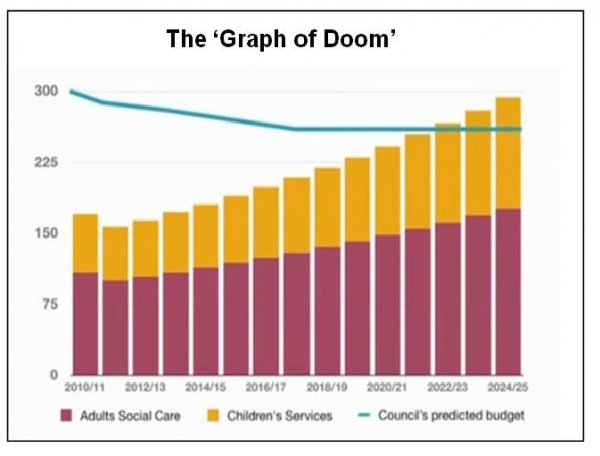Jul 6th 2020, 11:20
Blog 6th July 2020
In this blog I consider the additional funding that the government is providing to English local authorities to meet the costs and income shortfalls caused by coronavirus. I conclude that it is not enough to meet the shortfall and that councils will be forced to make further budget reductions in adult social care – a service that is already underfunded.
Last Friday, Robert Jenrick, the Secretary of State for Housing, Communities & Local Government announced an additional £0.5billion of funding for English local authorities to help to meet their costs and reduced income associated with the coronavirus pandemic. This brought the total additional funding for English local government because of the pandemic to £4.3billion. The government also announced a scheme whereby if a Council experiences a reduction of over 5% of their budgeted income from sales, fees and charges, the government will cover them for 75% of the loss. The government also announced that councils will also be able to spread tax deficits over three years, rather than the usual one year. Robert Jenrick said that:
“This government will continue to stand shoulder to shoulder with councils and communities as we recover from this pandemic as we renew our commitment to unite and level up the country.”
However, on closer examination, this additional funding really represents a reduction in the resources available to councils. The Local Government Association has calculated that coronavirus will cost English local authorities £10.9billion during 2020/21. This includes increased costs for example in adult social care and homelessness services and reduced income for example from car parking. Of this only £3.5billion will be met by additional government funding leaving a funding gap of £7.4billion. This contrasts with government statements that they would provide local authorities with whatever resources they needed to tackle the pandemic.
The Local Government Association has also calculated that local authorities face a shortfall of £2.8billion in their income budgets, so if the government reimburses 75% that would still leave a shortfall of £0.7billion.
 The offices of the Local Governmment Association in Westminster.
The offices of the Local Governmment Association in Westminster.
Rob Whiteman, Chief Executive of the Chartered Institute of Public Finance & Accountancy, said that:
“While the announcement of £500million additional funding is of course welcome news for councils, this does not cover the full extent of the costs they are incurring this year as a result of the pandemic, particularly cost pressures felt in social care… Covering 75% of income losses from fees and charges leaves a significant… financial gap. A further challenge is lost income from council tax and business rates… Deferring this over three years rather than funding the loss kicks the problem into the long grass.”
Geoff Winterbottom, the Principal Research Officer at the ‘Special Interest Group of Municipal Authorities’ (SIGOMA) that is part of the Local Government Association and represents urban authorities outside London, told ‘Public Finance’ that:
“Councils have gone ahead on (the basis that they would be reimbursed for additional costs and lost income), and I feel like the rope has slowly been pulled away, we feel like the goalposts have changed… £500million of funding does not even touch the sides.
“We had been quite hopeful because we had a briefing from the minister last week, who said a package was on the way, that - in his words - would enable local authorities to not make any in year adjustments to their budgets. In that context, whilst any money is welcome, it is bit of a disappointment because it is not going to achieve that objective. It is not going to allow authorities to go away and say that is this year taken care of, we do not need to amend budgets.
“I would imagine the vast majority of finance directors will go away today thinking what efficiencies do I have to find?”
Unfortunately, the main areas where councils will have to look for ‘efficiencies’ will be in Adult Social Care and Children’s services. Since the ring-fencing of funding for schools, these services have represented the largest un-ring-fenced budgets in local government; and since the start of ‘austerity’ have borne the brunt of budget reductions at a time of rising demand. Councils were already struggling to fund these services adequately before the pandemic. The Local Government Association had already produced the ‘graph of doom’ demonstrating that by 2022/23 Councils will not be able to fund these services even if they were to discontinue all the others.

Then the coronavirus pandemic struck causing a shocking number of deaths in care homes exposing the weaknesses in an under-funded system unprepared for a pandemic with inadequate personal protective equipment and access to testing. We all clapped for the carers, but what they really need is more resources.
So, I am appalled by the government’s response. Instead of ensuring that social care is adequately funded it is expecting local authorities to meet a significant part of the cost of the coronavirus pandemic by making further budget reductions in social care. And it is concealing this under misleading rhetoric about providing additional resources to local government.
It is widely reported that many local authorities are considering issuing section 114 notices. This is mainly because of the costs of the coronavirus pandemic but is also because of under-funding that already existed. Conservative controlled Northamptonshire County Council was the first to issue a section 114 notice in February 2018.
Section 114 of the Local Government Finance Act 1988 states that:
“The Chief finance Officer of a relevant authority shall make a report under this section if it appears to him that the expenditure of the authority incurred (including expenditure it proposes to incur) in a financial year is likely to exceed the resources (including sums borrowed) available to it to meet that expenditure”.
When a Section 114 notice is Issued, no new expenditure is permitted, except for that funding statutory services.
The government is, of course, reviewing local government funding in England through its ‘Fair Funding Review’ that has been postponed because of the pandemic. However, over time they have moved away from an initial intention to support local authorities in meeting the costs of the pandemic in full, to promising future attention in the context of ‘burden sharing’.
AWICS has been assisting the Local Government Association with its work on the ‘Fair Funding’ review. For further information about this, please click here.
We will be holding more webinars from July to September. For further information or to make a booking, please click the links below: